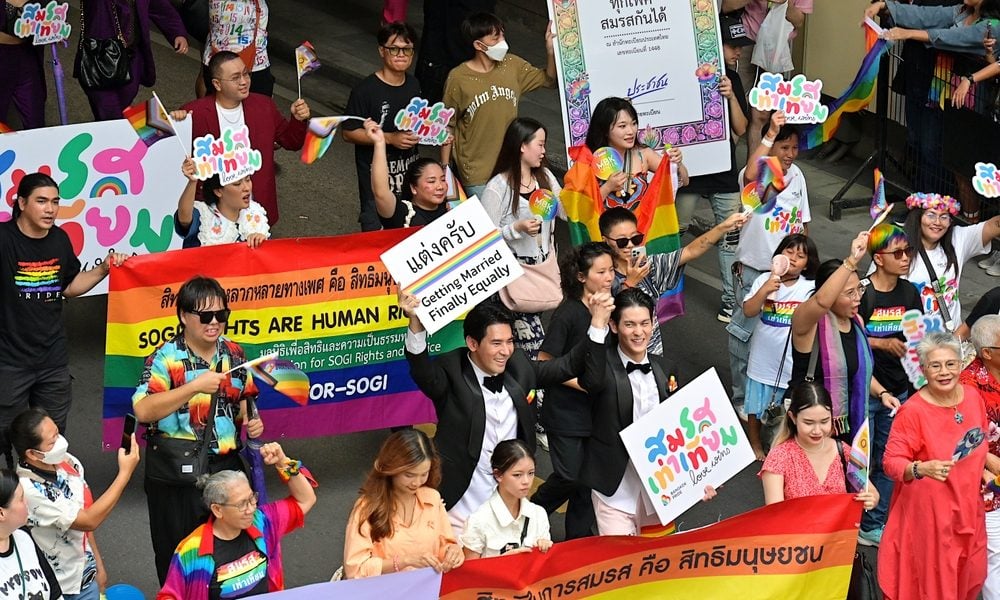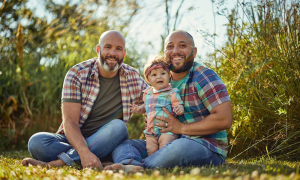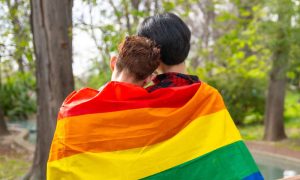For more than 13 years, Danaya Phonphayung and Sunma Piamboon have been in a committed relationship, celebrating their love and life together. Although their union was not legally recognized, the couple, who married in 2019, has always considered themselves married. This week, their bond—and the bonds of many other LGBTQ couples in Thailand—will finally gain legal recognition.
On Thursday, Jan. 23, 2025, a groundbreaking law will come into effect, making Thailand the first Southeast Asian country to legalize same-sex marriage. The law will allow LGBTQ couples to marry and enjoy the same legal, financial, and medical rights as heterosexual couples. For Danaya and Sunma, it’s the moment they’ve been waiting for—a chance to formally register their marriage and gain the legal rights they’ve longed for.
“I think I’ll cry,” Danaya, an office worker, said with a smile to NBC, thinking about the moment she and Sunma sign their marriage registration. “It’s something I’ve dreamed of, and now it’s finally happening.”
The couple, who live in suburban Bangkok, have shared a home, bought a car, and built a life together—but without the legal protections of marriage, their rights have been limited. As Danaya explained, the recognition of their marriage is more than symbolic; it’s about securing their future together.
“We live together, we bought a house, we bought a car. But we cannot share these things like a married couple,” she said. “Now, this is happening, and it’s our rights that we need to secure.”
Marriage Equality Bill Clears Thai Parliament
The marriage equality bill, which passed smoothly through Thailand’s House of Representatives and Senate, amends the Civil and Commercial Code to replace terms like “husband and wife” with “individuals” and “marriage partners.” The change paves the way for LGBTQ couples to gain full access to rights typically reserved for heterosexual married couples, including tax benefits, inheritance rights, and medical decision-making authority.
Sunma, who owns a travel agency, recalls a pivotal moment that made her realize the importance of legal marriage. When Danaya was hospitalized with dengue fever, Sunma faced bureaucratic hurdles and emotional distress when doctors questioned her relationship with Danaya. Unable to make medical decisions until Danaya’s condition worsened, Sunma realized how vulnerable they were without legal marriage.
“The doctors asked me who I was, and I said I was the girlfriend,” Sunma said. “They were like, ‘so what?’ I couldn’t make any decisions until her condition became serious. I was so upset. If I had lost her, there would be nothing that could make up for it.”
Thailand’s Long Road to Marriage Equality
Though Thailand is known for its reputation as a relatively LGBTQ-friendly country, the path to legalizing same-sex marriage was a long and difficult one. The country’s conservative social values often clashed with progressive calls for equal rights, and members of the LGBTQ community frequently faced discrimination in everyday life. However, attitudes toward LGBTQ rights have shifted in recent years, thanks in part to activism and advocacy efforts from within the community.
The government, led by the Pheu Thai Party, made marriage equality a key priority. Prime Minister Paetongtarn Shinawatra, who has supported LGBTQ rights, celebrated the milestone in a speech marking the law’s passage. Thailand is now the third Asian country—after Taiwan and Nepal—to legalize same-sex marriage.
“It’s almost like a dream, but it’s not,” Paetongtarn said. “I think it’s very important that the world notice us and know that in this small country, we have this kind of support for our people. We should all be proud.”
Celebrations and Preparations
To commemorate the law’s implementation, organizers of the Bangkok Pride Parade have teamed up with government officials to host a grand celebration in the city. Over 300 couples have already registered to marry on Jan. 23, with many attending the event to officially tie the knot.
Ann “Waaddao” Chumaporn, a prominent gender equality activist and lead organizer of Bangkok Pride, expressed the significance of the law for the LGBTQ community.
“The law is about returning our dignity and confirming that we have dignity as human beings,” Chumaporn said. “This day is meaningful to all the couples who have fought for this moment. I’d like to thank everyone who has struggled so that today would finally happen.”
In preparation for the law’s implementation, the Bangkok Metropolitan Administration has organized workshops for district office staff, educating them about gender diversity and how to interact respectfully with LGBTQ individuals registering their marriages. These workshops aim to ensure smooth processing and create a more inclusive atmosphere for couples.
“We’re ready. The law is ready. But the final piece of the jigsaw is the understanding from officials,” said Sanon Wangsrangboon, Bangkok’s deputy governor. He acknowledged that challenges might arise initially but expressed hope that societal understanding would grow over time.
Looking Ahead to a Full Celebration
For Danaya and Sunma, the journey is just beginning. After registering their marriage on Thursday, the couple plans to host a “real marriage celebration” with their families. While the couple is overjoyed, they recognize the significance of the occasion not just for themselves, but for their families as well.
“It’s not just the two of us that are happy, but both of our families,” Sunma said. “Everyone is waiting for Jan. 23. It’s a big deal for all of us.”
As Thailand ushers in this new chapter of LGBTQ rights, the country sets an example for the region, offering hope to other nations where same-sex marriage remains a distant dream. For LGBTQ couples like Danaya and Sunma, the law’s implementation marks not just a legal victory, but a personal triumph—one that celebrates their love and secures their future together.







